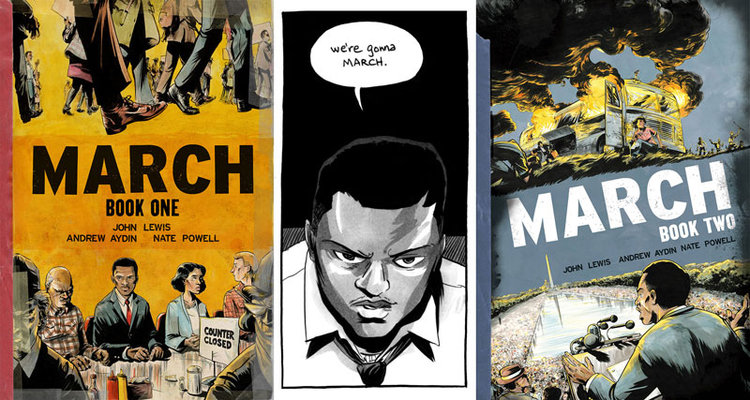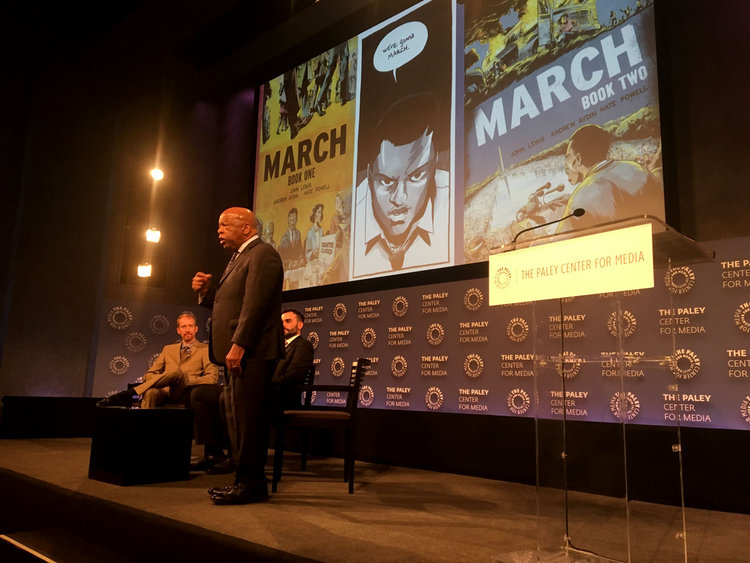Civil Rights Icon John Lewis Brings Graphic Novel Education to NYC Schools!
May 5, 2016

NEW YORK (May 5, 2016) — When John Lewis was a college student in Nashville, Tennessee, he attended a workshop on nonviolence that changed his life. Based on the principles of Gandhi and the recent Montgomery Bus Boycott, it also included a comic book — Martin Luther King and the Montgomery Story — as a take-home study aid in nonviolent resistance. “That little book became like a Bible for us,” says Lewis. Fifty years later, he teamed with co-writer Andrew Aydin and artist Nate Powell to adapt his own incredible life story into a series of award-winning graphic novels, entitled MARCH. The MARCH series is a #1 NYT-bestselling phenomenon, earning a Robert F. Kennedy Book Award, becoming a popular selection for university reading programs, and prompting the Washington Post to write, "There is perhaps no more important modern book to be stocked in American school libraries than MARCH."
Now, this groundbreaking graphic novel series reaches the nation’s largest public school system. Congressman Lewis and his MARCH co-creators, Andrew Aydin and Nate Powell, visited New York City today to address hundreds of the city’s social studies teachers about teaching the civil rights movement and their graphic novel series, which is being added to “Passport to Social Studies,” an expansive new curriculum developed by the New York City Department of Education. Students study the civil rights movement in the 8th grade, and now, teachers may choose to utilize lessons developed by the Department of Social Studies that feature scenes from MARCH, to discuss milestones such as John Lewis's speech at the 1963 March on Washington.
In today's session, New York's teachers had a rare opportunity to hear from a seminal figure of history whose story is vitally relevant to the modern day — and who now presents that story in a powerful new format for engaging today's students.

Teachers across the country, at every grade level, have embraced MARCH as a dynamic and powerful visual testimony of the civil rights movement, narrated by one of its major figures. For example:
-
"MARCH has become essential reading in my courses... From the poignancy of Lewis’ childhood sermons with the family chickens to the courage of Freedom Riders nearly trapped inside a burning bus, each panel of MARCH rewards close readers, inviting analysis and critical reflection." — Qiana Whitted, University of South Carolina
-
“MARCH brings the African American freedom struggle to life as no other memoir can. Told through the lens of Lewis’s remarkable biography, MARCH encapsulates many of the most important themes of the Civil Rights Movement, and American history more generally. Students at all levels will find that the vivid illustrations and quick pace make the narrative exciting to read, while also allowing for in-depth understandings about the complicated themes of race, equality, and perseverance in twentieth-century America. Nate Powell’s lines remain true to the horrific reality of U.S. history, while somehow highlighting people’s agency and humanity in the face of American racism and violence.” — Dave Gilbert, Mars Hill University
-
"I have never had to ask students to put books down before, until MARCH." — Judith Marks, Olney Charter High School, Philadelphia, PA